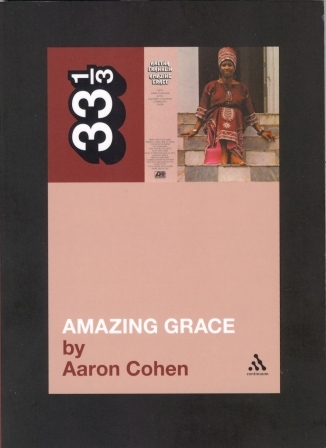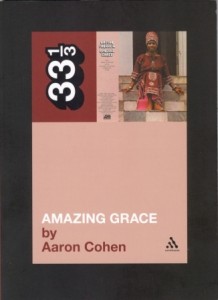Continuum 2011
http://www.continuumbooks.com/
It was January 13, 1972.
Gospel music’s reigning queen Mahalia Jackson was sick and near death. Gospel’s grande dame Roberta Martin had passed away three years to the day. In a year, Clara Ward would be gone. A generation of gospel pioneers was passing from memory as a new troupe of contemporary stylists was reinventing the gospel sound.
With the strategic pacing of a sermon or gospel song, Cohen’s study moves from details about Aretha’s musical influences, the album’s genesis and the socio-political mood of the day to a colorful report of the actual recording session, made all the more vivid because the author’s access to the long-lost film documentary of the session gave him as close to a firsthand witness’s account as possible. His song-by-song analysis is the narrative’s apex, providing further insight into Aretha’s overall vision for the album. The book rolls to a finish with reports of the critical acclaim the album received after its release.
Since Cohen interviewed a number of the musicians who worked on the album, Amazing Grace contains that often overlooked but nevertheless critical point of view: from the bandstand. As the book testifies, musicians are perfectly positioned to be indefatigable observers of the goings-on.
With a journalist’s gift of observation and language, Aaron Cohen provides us with a glimpse into how a work of musical art is created – those million minute details, the unpredictable group dynamics, the missteps and makeovers, the flashes of genius and the priceless moments of musical transfiguration when talent and preparation align to create enduring art.
Amazing Grace is as engaging and entertaining as it is thought-provoking, a pleasure to read.
3 Comments
Leave A Comment Cancel reply
Written by : Bob Marovich
Bob Marovich is a gospel music historian, author, and radio host. Founder of Journal of Gospel Music blog (formally The Black Gospel Blog) and producer of the Gospel Memories Radio Show.












 Visit Today : 10
Visit Today : 10 This Month : 133
This Month : 133
I have got to read this!!
Great review Bob. I can’t wait to read your own book when you finish it.
I picked up a copy at Reckless Records this weekend. It’s a good read. Thanks to Aaron.